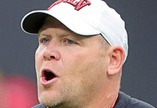Tina Quigley, president and CEO of the Las Vegas Global Economic Alliance, had her reservations about LOCATE Las Vegas. The initiative, which entrusted the developmental authority with courting 17 global company leaders in hopes of attracting them to Southern Nevada, already felt like an expensive, time-intensive task. Add on the pressure of doing it during Super Bowl LVIII weekend and they certainly had their work cut out for them.
“I was very worried about the types of companies we would be able to get. Were they just coming for that extended weekend so they could get to the Super Bowl?” Quigley says. “It wasn’t until we started identifying the companies and having these vetting conversations with them that I started realizing, ‘Oh my gosh, I think there are companies who are really truly … interested.’”
Over three days, the touring leaders had a rare look behind the curtain, visiting off-Strip destinations like Red Rock Canyon, and learning about our business ecosystems. They met with more than 150 stakeholders, chief among them being Rama Venkat, dean of UNLV’s Howard R. Hughes College of Engineering, who Quigley credits as being one of their most important assets.
“He met with the companies that had any type of engineering-related need or scientific technique, and he was a great partner,” she says. “As a result, some companies I think will probably land here before the year is even over.”
Due to non-disclosure agreements, Quigley couldn’t name the companies who participated in the initiative, but she confirmed at least seven of them met with Venkat, intrigued by the College of Engineering—and rightfully so. In February, UNLV unveiled its new three-story, 52,000-square-foot Advanced Engineering Building, a shiny indicator of just how essential the engineering sector has become, and that’s supported by the stats. The college is rapidly growing, with a 25% enrollment increase of engineering and computer science majors projected by 2030, Venkat told the Weekly in March.
All that considered, it’s no wonder the LOCATE Las Vegas companies saw an attractive prospect.
“It is really valuable that the UNLV School of Engineering is growing. Because now we have a true talking point for these companies to say, ‘Hey, your workforce is here,’” Quigley says.
To ensure that the workforce remains here, UNLV’s College of Engineering has pioneered the StepUp & StartUp Internship Program, connecting engineering students from underrepresented groups with local startups. The SUSU program, now in its second year, is funded by the Nevada Governor’s Office of Economic Development, making it possible for these startups to actually pay their interns and get reimbursed.
Alejandro Chacon, internship coordinator, has been with the program since the beginning and has already seen three students get hired in full-time roles.
“That’s the goal, that eventually my students will end up staying here in Las Vegas, working here in Las Vegas and having a really strong pool of engineers,” says Chacon, who steers students through the process of preparing for interviews, and shaping up their résumés and portfolios.
For Marcos Kano, a 19-year-old senior double majoring in computer science and math, joining the SUSU program “completely changed the game.” Kano first landed an internship with Arete Games, aiding in the release of a mobile video game. Now he’s interning with local tech company BLT SMRT and on track to secure his first engineering job.
“In software engineering, it’s very common that you don’t find your first job for maybe a year or more after you graduate from college. To avoid that I was getting certificates. I was doing a lot of extracurriculars, trying to build up my résumé, but nothing compares to experience,” says Kano, who at age 9 taught himself how to code by watching YouTube videos. “I was kind of worried if I was gonna get a job and how long that would take. But I’ve already been working for a year now.”
Kano sees the program as a satisfying way to get paid and “learn exactly what I wanted to learn.”
In its first year, the engineering program doled out 50 paid internships at 24 local startups. Chacon says employers undergo an intensive vetting process, with Black Fire Innovation, Manufacture Nevada, StartUpNV and Zero Labs helping connect UNLV with startups.
“I believe the students in our community do what they see other people doing. They build their career aspirations, the bulk of them, from what they see their parents, their uncles, their sisters, their brothers doing,” says Lauri Perdue, vice chairwoman of the LVGEA and the University of Phoenix's national workforce director. “We have a great opportunity here to change that narrative and help our young people see pathways to engineering, see pathways to fintech, see pathways to biomed.”
The scope of the industry is broader than some might think, and programs like SUSU bring awareness to that, Perdue says.
“[Students] start to worry because they hear about Meta and Amazon and all of these companies that are letting [people] go and you have to say, hey, they’re not the whole industry,” Chacon says. “I have my civil engineers and my construction engineers who are still very focused on designing and transportation. And with Las Vegas changing the way it is, being a sports mecca, and transportation with Brightline West coming in, all of that is exciting for my students.”
Perdue, who has piloted a new Talent Pipeline Council made up of education representatives, government agencies and other stakeholders to address workforce challenges, agrees that this is prime time for aspiring engineers, thanks to developments like Brightline West. “They don’t have to create the storm drains of our city, there are sexy new projects in this city that would bring them in,” she says.
So if the LVGEA is looking to expand and diversify our economy wherever it can, engineering is as good a place as any to start.
“We have to be pumping up the workforce, but we have to have a place for that workforce to land in order for it to be worthwhile for the university to invest in that workforce,” Quigley says.“It really is very small baby steps in terms of industry, education and partnerships. And that’s the only way to do it.”
Click HERE to subscribe for free to the Weekly Fix, the digital edition of Las Vegas Weekly! Stay up to date with the latest on Las Vegas concerts, shows, restaurants, bars and more, sent directly to your inbox!





